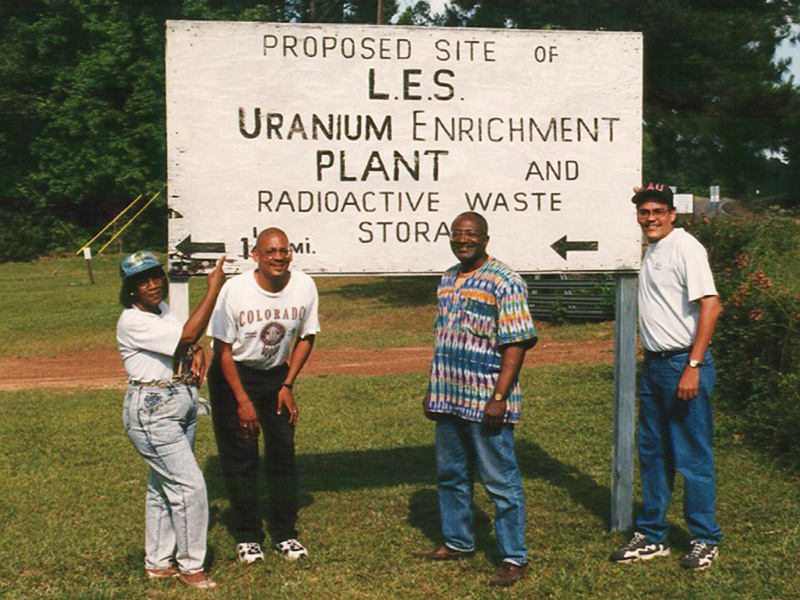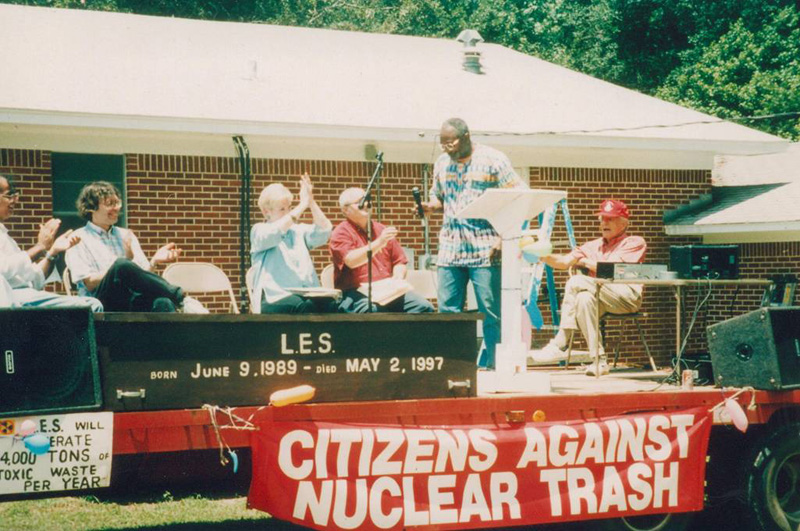Today, we celebrate the story of Homer, Louisiana — a community that defeated a proposed uranium enrichment plant in 1997, one the first environmental justice victories!
This weekend, we commemorate and celebrate Juneteenth, honoring the struggle for Black liberation in the US. Officially proclaimed a federal holiday last year by Congress, Juneteenth is named for the date—June 19th, 1865—when word of their liberation finally reached enslaved people in Texas. They were the last to be told of their freedom, their oppressors having kept them in bondage more than two months after the confederacy’s army surrendered.
Juneteenth is time to reflect upon and dedicate ourselves to collective liberation. Juneteenth matters because it marks when the last were emancipated, not the first. It marks the fulfillment of freedom and equality, not promises. In our national culture, we have a tendency to celebrate the birth of democratic ideals, rather than their deliverance. Juneteenth signifies that we cannot be free until all are freed.
Juneteenth also reminds us that freedom isn’t free. Rights and liberties are hard-fought in the US and we cannot take them for granted. Holding and expanding freedom requires constant maintenance and organizing. Though the campaign for freedom never ends, we still must celebrate our victories, our communities, and our joys.
At NIRS, Juneteenth means breaking the chains of extractive and unjust industries like nuclear. It means speaking the truth about nuclear dangers, threats, and wastes in the face of propaganda about the false promise of nuclear energy. It means telling the fraught and violent history of the nuclear industry and celebrating the communities that have stood up against the nuclear state to protect their own safety and survival. Today, we celebrate the story of Homer, Louisiana – a community that defeated a proposed uranium enrichment plant in the name of environmental justice.
A Landmark Environmental Justice Victory in Louisiana
Environmental justice is a key principle in the fight against dirty energy because it recognizes the disproportionate impact of environmental harms – from the disasters of a changing climate to the site selection of polluting industries – on Black, Indigenous, People of Color and low-wealth communities.
Environmental injustice is rampant in the nuclear industry. Uranium mines, nuclear waste dumps, toxic incinerators, atomic reactors and other such facilities typically are located where there is cheap land, cheap facilities, and little organized opposition. Too often, this has been in Black, Indigenous, People of Color and low-wealth communities that, because of entrenched structural oppression, have less political power to oppose corporate giants, covert military projects, and the like.
In February 1994, President Clinton issued Executive Order 12898, requiring federal agencies to consider environmental justice issues when issuing permits for new polluting facilities. Although the Nuclear Regulatory Commission was exempt from that order due to the agency being independent, then-Chairman Ivan Selin committed the NRC to implement the order. The issue of environmental justice in the nuclear industry would soon be put to the test.
The story begins with Louisiana Energy Services (LES), a multinational consortium, that began searching for a site to build a private uranium enrichment plant in the United States. Uranium “enrichment” is a key step in making nuclear power and weapons fuel–it concentrates uranium-235 atoms leaving other uranium atoms as long-lasting, dangerous waste.
In 1989, LES announced that it had selected a 442–acre site in Claiborne Parish, Louisiana and applied to the NRC for a 30-year license to operate their enrichment plant. The company claimed no one lived there but the proposed site was immediately adjacent to and between the unincorporated African–American communities of Center Springs and Forest Grove, about 5 miles from the town of Homer, Louisiana.
In the court decision years later, the NRC described these communities:
“The community of Forest Grove was founded by freed slaves at the close of the Civil War and has a population of about 150. Center Springs was founded around the turn of the century and has a population of about 100. The populations of Forest Grove and Center Springs are about 97% African American. Many of the residents are descendants of the original settlers and a large portion of the landholdings remain with the same families that founded the communities. Aside from Parish Road 39 and State Road 9, the roads in Center Springs or Forest Grove are either unpaved or poorly maintained. There are no stores, schools, medical clinics, or businesses in Center Springs or Forest Grove.”
https://www.ejnet.org/ej/LES.pdfIn addition, the NRC explains that the schools in the area are racially segregated and that many residents remain unconnected to the public water supply. The communities are “part of a population that is among the poorest and most disadvantaged in the United States.” It soon became clear that the site was explicitly selected to take advantage of these communities under the assumption that the disadvantaged and disenfranchised would be unable to mount resistance against LES.
But, as word of this proposed uranium enrichment plant spread to the residents of Claiborne Parish, concern and opposition grew. The residents formed a local group called Citizens Against Nuclear Trash (CANT) and began organizing their resistance. They recruited assistance from others in the anti-nuclear movement including folks at NIRS, IEER, Harmon and Curran, and Earthjustice to file an objection with the NRC and rallied a tremendous grassroots campaign to block LES from building the plant.
According to an Earthjustice blog, CANT “sent busloads of residents every day the 50 miles from Homer to Shreveport, where the hearings were held, to observe. They organized support among the congressional Black Caucus and 182 environmental organizations from 18 countries.” Among the expert witnesses was Dr. Robert Bullard, the father of environmental justice, who testified during the NRC proceedings and the formal hearing on why the LES siting decision constituted environmental racism.
And they won in 1997. An unprecedented legal ruling from the NRC found that the siting of the plant constituted environmental racism. LES became the first license applicant before the NRC ever to be denied a license and they were denied on the grounds of environmental racism. Years of organizing ultimately prevailed before a Nuclear Regulatory Commission Atomic Safety and Licensing Board (ASLB) and CANT won one of the nation’s first courtroom verdicts on environmental justice.
This Juneteenth, we recognize the extraordinary work of CANT in fighting for justice and winning against powerful, profit-hungry interests that would sacrifice the wellness and survival of their community.
But, the victory at Claiborne Parish, Louisiana did not end LES’s efforts. LES continued searching for a site to build the dirty uranium enrichment plant. And the environmental justice precedent set by CANT’s victory threatened the nuclear industry’s business-as-usual practice of environmental racism. Reeling from this blow—after all, one denial in 45,000 applications might indicate a trend—the nuclear industry suggested to the NRC that it remove environmental justice from further licensing consideration.
Freedom, liberty, and justice aren’t free. These rights are not easily won nor are they guaranteed. President Clinton’s Executive Order on Environmental Justice is a major milestone, one that paved the way for communities to prevail against entities like LES, but it is not the finish line.
Every community has a right to clean air, water, and economic opportunity. No community should bear the burden of the toxic waste produced by nuclear energy. We cannot continue to shift the health and environmental externalities of nuclear–from the beginning of the nuclear fuel chain through the processing and storing of nuclear wastes–onto vulnerable and disenfranchised communities. In respect of Juneteenth, our newest federal holiday, Congress and President Biden must honor the meaning of the holiday. It is time for a truly just and equitable climate policy that ends our reliance on nuclear and heals all communities that bear the burdens of dirty energy.
The post Honoring a Landmark Environmental Justice Victory in Louisiana appeared first on NIRS.

 2 years ago
19
2 years ago
19




